During the war in Iraq, young US Marine and Army captains have become viceroys, officers with large sectors to run and near-autonomy to do it. In Army parlance, they are the "ground-owners." In practice, they are power brokers.
"They give us a chunk of land and say, 'Fix it,'" said Captain Rich Thompson, 36, who controls an area east of Baghdad.
The Iraqis have learned that these captains, many still in their 20s, can call down devastating US firepower one day and approve multimillion-US dollar projects the next. Some have become celebrities in their sectors, leaders whose names are known even to children. Many believe that these captains are the linchpins in the Americans' strategy for success in Iraq, but as the war continues into its sixth year the Army has been losing them in large numbers - at a time when it says it needs thousands more.
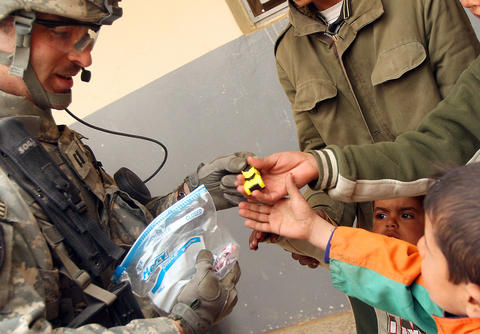
PHOTOS: AFP
Most of these captains have extensive combat experience and are regarded as the Army's future leaders. They're exactly the people the Army most wants. Unfortunately for the Army, corporate America wants them too. And the hardships of repeated tours are taking their toll, tilting them back toward civilian life and possibly complicating the future course of the war.
"I have served my time; I've done two tours in Iraq," said Captain Kirkner Bailey, 26, of the 3rd Armored Combat Regiment in Mosul.
"For the past three years of my life I have either been in Iraq or training to go to Iraq," he added. "I just know that there is more to life than this war, and my girlfriend Shannon and I are interested in finding out what that is."
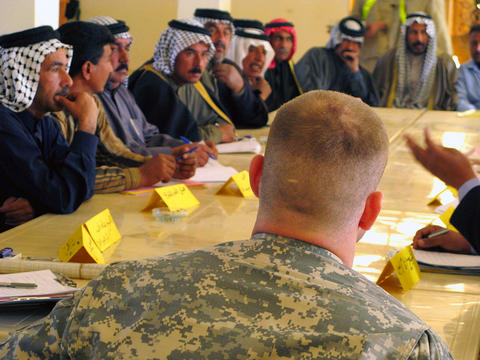
PHOTOS: NY TIMES NEWS SERVICE AND AP
"I can't speak to trends," he said. "But eight of my 10 friends who are captains are leaving the Army."
THE MANTLE OF POWER
It is hard to overstate the importance of these officers to the American war effort. Captain Brian Gilbert, 30, who controls a million-US dollar monthly Army budget for his sector of 200,000 residents here in Jisr Diala, a city east of Baghdad, has pulled together a group of tribal leaders as well as a local Iraqi security force, not to mention keeping a close eye on the elected city council.
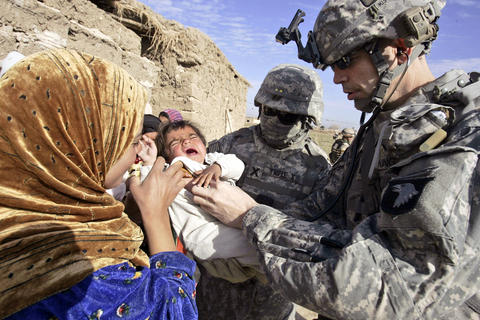
PHOTOS: NY TIMES NEWS SERVICE AND AP
On a recent afternoon, he ordered traffic control barriers installed to prevent car bombs, checked on refurbished water pumps for farmers and approved money to connect the pumping station to the Baghdad electricity grid. Then there were soccer uniforms to be dropped off for a community team, heated disputes to resolve, an influential sheik to visit.
"It is purely my fight in my area of operation," he said. "I decide the targets, I decide the development projects and I choose to partner with the Sons of Iraq," a reference to the local security group that he helped to set up.
"It is the captains who turn the 'big ideas' and broad guidance issued at high levels into specific actions geared to local circumstances," said General David Petraeus, the top US commander here. "Captains plan and execute the operations that often prove the most important, at ground level, where gains are truly achieved in this type of endeavor."
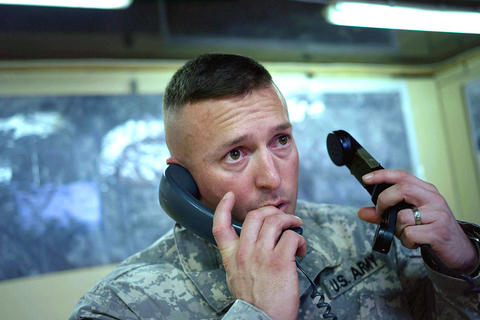
PHOTOS: NY TIMES NEWS SERVICE AND AP
But as the war has lasted, the nature of that work has changed, many captains say. Petraeus' counterinsurgency doctrine is centered on relatively small groups of soldiers establishing outposts in communities and living among the Iraqis. The result is a war that has largely been transformed into a fight controlled by captains.
When Gilbert began his third tour in Iraq February last year, he inherited a sector of Jisr Diala that had been patrolled only part-time. "There was at least one kidnapping a day," he said. The streets in some areas were lined with roadside bombs, one of which destroyed a Humvee, killing three of Gilbert's soldiers.
"I've lost more of my friends in Iraq than I can count on two hands," he said.

PHOTO: AP
His company pushed on, conducting foot patrols, talking to residents and gaining trust. And with the creation of a local security force, violence has been reduced significantly: In their first month of operation, the Sons of Iraq found four large arms caches, one containing more than 100 IEDs, or improvised explosive devices, for roadside bombs. They began to fight side by side with the Americans against insurgents, and last year one of their members was killed when he tackled a suicide bomber approaching a group of Gilbert's soldiers.
"My previous tours were frustrating," Gilbert said. "The first tour there was jubilation at the fall of Saddam. Then it was like, 'Now what do we do?' We were just doing security.
"On the second tour, we were fighting 24 hours a day in Samarra. If we saw Iraqis they were often shooting at us or reconning us. We got hit with an IED on every patrol we went on. I felt successful because I killed the enemy, but I was frustrated every day. I couldn't rebuild the area. When we'd do a project, the next day they would blow it up. We couldn't win hearts and minds because we were under constant threat."
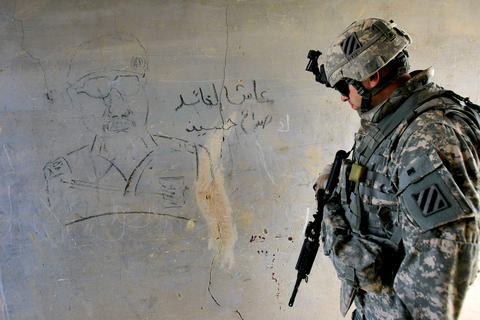
PHOTO: NY TIMES NEWS SERVICE
Now, he said, the Iraqis he works with are more than receptive: "If I do a project in one village, they go and brag about it and then the next village wants the same thing."
Still, for all the seemingly endless projects and negotiations, Gilbert says, "the real question is, how does the population feel about you? Are you an occupier or a friend?"
And then there is the irrepressible strain of repeated deployments. Gilbert was in Iraq when his daughter, 2 1/2, was born. He has spent more than half her life here and has misgivings about being away from his family.
TAKING WORK HOME
"When I got home from my last deployment, the phone was ringing all the time with job offers from headhunters," Gilbert said. "They're not pushy, but they tell you what they were able to do for other captains." Despite the pressures, Gilbert sees himself returning to Iraq, saying "We're getting where we want to be."
But only a day after he was pinned with his captain's bars in earlier this month, Bailey in Mosul knew he would leave the Army as soon as his deployment was over. "We're leaders proven under fire," Bailey said. "Put me in the most stressful corporate board meeting and I'll laugh."
Last year, the Army authorized
re-enlistment bonuses for captains of up to US$35,000. But corporate recruiters have matched that, captains say. And most captains make a base pay of US$4,000 to US$5,000 a month in the Army, a figure they can easily exceed in corporate America.
Even so, money is not the deciding factor in leaving the Army, most captains say.
"Many of the brightest and most experienced captains of my generation are being driven out of the Army by the prospect of a career filled with deployments every other year," said Captain Patrick Ryan, who says he is certain to leave the Army when his five-year commitment is done. "I think the Army stands to lose a generation of battle-tested junior leaders."
Even "in the one-year time window between deployments, much of your 'time home' is not really yours," Ryan added. It is a sentiment echoed by many of the captains: "The pressures during the year at home are tremendous," said Captain David Sandoval, commander of Company A, 1st Battalion, 8th Infantry of the 3rd Armored Cavalry Regiment.
There is constant training, new gear and technology to be mastered, new soldiers to fit into the units. And there is round-the-clock responsibility for the people under their command. Disintegrating marriages, financial problems, sick children and post-traumatic stress fall on their shoulders.
"We got back from our last tour and immediately there were rumors we were re-deploying," said a captain who requested anonymity for fear of displeasing his superiors. "Some of these guys are 18, 19 years old. They've just been through a year of combat. They went crazy. They started fighting, drinking, crashing cars."
Sandoval's company, considered one of the best in the brigade, also had troubles upon returning home. "They're not all alright when they come home," he said. "There are domestic violence problems. I'm part marriage counselor, part drug and alcohol counselor, part suicide prevention counselor. It's an emotional roller coaster."
Here in Iraq, however, Sandoval can't sleep when his men are out on patrol, and almost every night they are. His men say he goes for days without sleep. He denies this. "I sleep at least three hours a day," he said, his eyes rimmed with red.
And he worries about the burden on his own family, on his wife, who is in charge of helping all the other families of Company A soldiers back home, and on his 13-year-old son and 9-year-old daughter. He kept his most recent deployment from them until the last minute, he said.
"My daughter struggles the most," he said. "Every month it is a little tougher for them."
Yet Sandoval loves the Army and plans stay in it: "I joined at 19. I thought I'd do two years, be out at 21 and have money for college. Sixteen years later I'm still here."

On April 26, The Lancet published a letter from two doctors at Taichung-based China Medical University Hospital (CMUH) warning that “Taiwan’s Health Care System is on the Brink of Collapse.” The authors said that “Years of policy inaction and mismanagement of resources have led to the National Health Insurance system operating under unsustainable conditions.” The pushback was immediate. Errors in the paper were quickly identified and publicized, to discredit the authors (the hospital apologized). CNA reported that CMUH said the letter described Taiwan in 2021 as having 62 nurses per 10,000 people, when the correct number was 78 nurses per 10,000

As we live longer, our risk of cognitive impairment is increasing. How can we delay the onset of symptoms? Do we have to give up every indulgence or can small changes make a difference? We asked neurologists for tips on how to keep our brains healthy for life. TAKE CARE OF YOUR HEALTH “All of the sensible things that apply to bodily health apply to brain health,” says Suzanne O’Sullivan, a consultant in neurology at the National Hospital for Neurology and Neurosurgery in London, and the author of The Age of Diagnosis. “When you’re 20, you can get away with absolute

May 5 to May 11 What started out as friction between Taiwanese students at Taichung First High School and a Japanese head cook escalated dramatically over the first two weeks of May 1927. It began on April 30 when the cook’s wife knew that lotus starch used in that night’s dinner had rat feces in it, but failed to inform staff until the meal was already prepared. The students believed that her silence was intentional, and filed a complaint. The school’s Japanese administrators sided with the cook’s family, dismissing the students as troublemakers and clamping down on their freedoms — with

As Donald Trump’s executive order in March led to the shuttering of Voice of America (VOA) — the global broadcaster whose roots date back to the fight against Nazi propaganda — he quickly attracted support from figures not used to aligning themselves with any US administration. Trump had ordered the US Agency for Global Media, the federal agency that funds VOA and other groups promoting independent journalism overseas, to be “eliminated to the maximum extent consistent with applicable law.” The decision suddenly halted programming in 49 languages to more than 425 million people. In Moscow, Margarita Simonyan, the hardline editor-in-chief of the